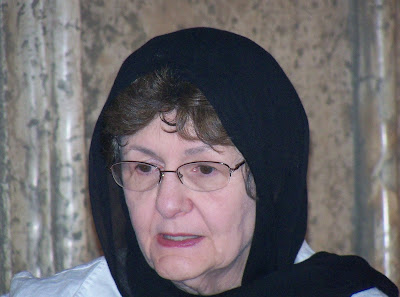Today we had wake up calls at 6:30. I woke up and immediately started the day with some cardio at the hotel’s gym. I have a feeling that this will be the only hotel that has these kind of facilities. Skipping breakfast, I had a protein bar and made my way to the bus.
There is a global array of folks here. It is interesting to see so many cultures sharing their morning need for nicotine and caffeine. All of us were on time…well almost Nafeesah got lost coming from the bathroom for about 10 minutes, but we finally found her. The hotel grounds are large and circuitous.
Last night we began with an arrival reflection from the Muslim tradition so this morning Jill and I offered prayers for arrival and a reflection. I gave a kavannah (intention) before the Shehechiyanu prayer focusing on arriving within not just physically. I hoped that we did not fall prey to tourist consumption, needing to see everything in a frenzy but that we could be aware and present with each other , the people we were encountering and the places we were visiting. I also shared that the Jewish concept of pilgrimage involved sacrifice…meaning the desire to get closer—to one’s self, each other and a sense of godliness. Jill shared about the spiritual practice of eating. Reflecting that Jesus never missed an opportunity to share a meal; he used that time to teach. She said he ate with disciples, tax collectors, prostitutes, etc. ( I did ask her which one best represented us.) She then offered a beautiful spontaneous prayer of arrival.
At this point Yasser, our tour guide spoke to us about the pyramids that we were about to see. Before he began he gave us a lesson about how Egyptians identify themselves as Misri. Where does the word come from? Jews will recognize it as connected to Mitzrayim—the Biblical name for Egypt. The narrow places. In looking at the lay-out of Egypt, he explained that the East side of the Nile was used for worship, service, education, etc. and the West bank was for tombs, graveyards, and “2nd homes”—the residence of the afterlife. It was a bit surreal to see the Gisa Necropolis so close. Within the first pyramid, there were 5 tombs, but only two have been discovered. More than anything, I present to the awe and mystery the pyramids inspire. So many questions and theories exist but nothing definitive. Then secondly, I am humbled by the human labor involved. To make us feel better, the guide explained that there were no slaves, everybody participated willingly receiving water and food but their willingness was to participate in the spiritual reward. That still sounded like slavery to me.
I took an awesome camel ride with a handful of pilgrims and shared my camel with Nafeesah. Getting up and then off the camel was an exciting adventure.
The rest of the day we saw antiquities including the Sphinx and the discoveries at Memphis, but the poverty and the pollution were just as overwhelming as the history. Nassar and I began speaking about witnessing the human aspect and the difficulties of it. I also, was challenged by the necessity of being firm as people insisted that you buy something or have a picture taken. One woman in our group, was lifted up on a camel without asking and then she was let down after strongly suggesting that she give them some money. Another man took a picture with Egyptian police, who also harassed him for a few dollars in exchange. Boundaries and open heartedness—a hard combination. We also saw a number of small children leading horses and camels and we passed the dozens of carpet schools where young children help bring money for their families by learning how to weave rugs—but for how much? Our guides was illusive.








































